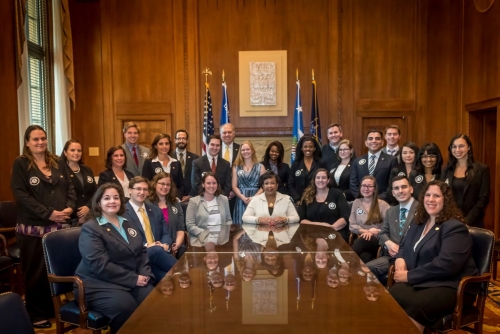WH-LAIR Designated Co-Chairs Announce First Annual Report to the President
“Equal access to justice…advances the missions of an array of federal programs, particularly those designed to lift Americans out of poverty or to keep them securely in the middle class,” said President Obama in his 2015 Presidential Memorandum formally establishing the Legal Aid Interagency Roundtable, a collaboration that began in 2012, as a White House initiative.
Today, the White House Legal Aid Interagency Roundtable (WH-LAIR) published its first annual report, entitled “Expanding Access to Justice, Strengthening Federal Programs.” The report documents the significant steps the 22 federal agency members of WH-LAIR have taken to integrate civil legal aid into their programs and policies. It is a remarkable collection of activities, research, data and success stories, illustrating the impressive outcomes we can expect when federal agencies leverage their resources to maximize impact for the people they serve.
In one of the report’s many success stories, a veteran with medical needs fell behind on his rent and faced eviction. But a legal aid provider, with U.S. Department of Veterans Affairs’ funding, helped negotiate an agreement with his landlord to stop the eviction and stabilize his housing. In another, Francesca, a 21-year-old single mother of two, struggled to pay off a three-year-old, $300 municipal ticket for taking $20 worth of clothing—only to find that her criminal record prevented her from getting stable employment. A U.S. Department of Labor grantee referred Francesca to their legal aid partner, Legal Action of Wisconsin, for help. A legal aid attorney quickly got Francesca’s ticket dismissed, and Francesca got a job. In less than eight months, she earned a raise. These examples illustrate how smart programming can serve key federal priorities—like ending veteran homelessness and giving those who made a mistake a second chance—by including an effective solution: civil legal aid.
As the designated co-chairs, we are privileged to share the game-changing work of WH-LAIR with the president and with the American people. The report demonstrates that many federal agencies have embraced civil legal aid as a powerful tool that can make federal programs more effective. For example, the Federal Trade Commission (FTC) has formed robust relationships with legal aid providers through its Legal Services Collaboration and a number of FTC’s successful enforcement cases—such as bogus work-at-home offers and fraudulent mortgage relief services—resulted from referrals from legal aid providers. Recognizing the role that civil legal aid can play in advancing enforcement priorities has encouraged federal agencies to deepen and expand their collaborations with legal aid.
The report also highlights how federal agencies collaborate effectively and build on one another’s work to address multifaceted problems with multifaceted solutions. For example, several WH-LAIR agencies administer programs to help crime victims, including victims of domestic violence, elder abuse and human trafficking. Many of those programs engage state and local partners, and they rely on legal aid to help crime victims stabilize their lives and address problems that flow from their victimization, such as securing housing, medical assistance, public benefits, immigration relief, education, employment or child custody and support orders.

Legal aid also prevents future incidents of violence by obtaining and enforcing protective orders for clients, providing resources to law enforcement and holding perpetrators accountable. For example, working across agency lines, the Justice Department and the Corporation for National and Community Service created Elder Justice AmeriCorps, the first-ever army of lawyers and paralegals to help victims of elder abuse. And the Legal Service Corporation's Technology Initiative Grant helped a California legal aid program develop an e-filing tool for domestic violence protection orders to increase collaboration among legal aid, local courts and the police. The e-filing tool allows victims of domestic violence to electronically file protective order requests, so that judges can issue orders more quickly and make them available immediately to the protected party and law enforcement.
Finally, the report serves as a blueprint for more effective government. By adding civil legal aid to their toolbox, federal agencies can more efficiently and effectively address the serious problems that affect our communities and the most vulnerable among us—problems like domestic violence, financial exploitation of the elderly, veteran homelessness, reentry and crime. This report shows how it can be done and done well.

 U.S. Department
of Justice
U.S. Department
of Justice
